高考英语时态必备
高考英语必须掌握的八大时态结构

高考英语必须掌握的八大时态结构一、一般现在时1、概念:表示经常发生的情况;有规律出现的情况;总是发生的;事实真理。
2.时间状语: Always, usually, often, sometimes, every week (day, year, month…), once a week (day, year, month…), on Sundays (on Mondays…), etc.3.基本结构:主语+动词原形(如主语为第三人称单数,动词上要改为第三人称单数形式)4.否定形式:主语+am / is / are+not+其他;此时态的谓语动词若为行为动词,则在其前加 don't,如主语为第三人称单数,则用 doesn't,同时还原行为动词。
5.一般疑问句:把 be 动词放于句首;用助动词 do 提问,如主语为第三人称单数,则用 does,同时,还原行为动词。
eg:①It seldom snows here. 这里很少下雪。
②He is always ready to help others. 他总是乐于帮助别人。
③Action speaks louder than words. 事实胜雄辩。
二、一般过去时1.概念:过去某个时间里发生的动作或状态;过去习惯性、经常性的动作、行为。
2.时间状语:ago, yesterday, the day before yesterday, last week, last (year,night,month…), in 1989, just now, at the age of 5, one day, long long ago, once upon a time,etc.3.基本结构:主语+动词的过去式或 be 的过去式+名词4.否定形式:主语+was / were+not+其他;在行为动词前加didn't,同时还原行为动词。
5.一般疑问句:was 或 were 放于句首;用助动词 do 的过去式 did 提问,同时还原行为动词。
高考英语16种英语时态
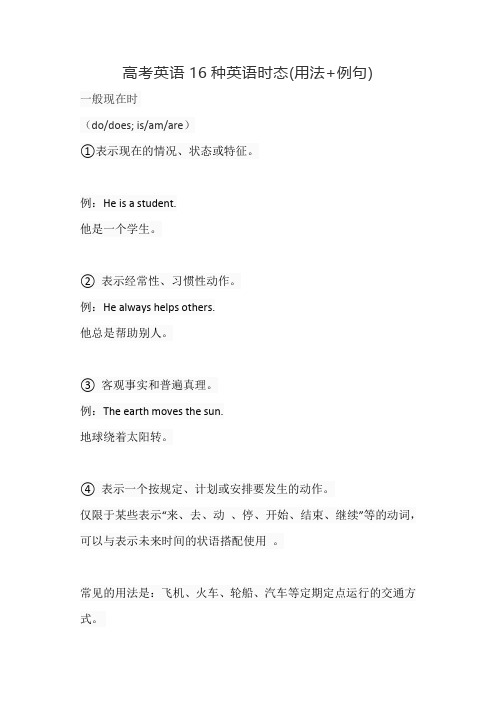
高考英语16种英语时态(用法+例句)一般现在时(do/does; is/am/are)①表示现在的情况、状态或特征。
例:He is a student.他是一个学生。
② 表示经常性、习惯性动作。
例:He always helps others.他总是帮助别人。
③ 客观事实和普遍真理。
例:The earth moves the sun.地球绕着太阳转。
④ 表示一个按规定、计划或安排要发生的动作。
仅限于某些表示“来、去、动、停、开始、结束、继续”等的动词,可以与表示未来时间的状语搭配使用。
常见的用法是:飞机、火车、轮船、汽车等定期定点运行的交通方式。
例:The next train leaves at 3 o'clock this afternoon.下一趟火车今天下午3点开车。
⑤ 在时间、条件和让步状语从句中经常用一般现在(有时也用现在完成时)表示将来的事情。
(即:主将从现原则)例:I will call you as soon as I arrive at the airport.我一到机场就会给你打电话。
When you have finished the report, I will have waited for about 3 hours.等你完成这份报告的时候,我就已经等了将近3个小时了。
2 现在进行时(am/is/are doing)①表示此时此刻正在发生的事情。
例:He is listning to the music now.他现在正在听音乐。
② 表示目前一段时间内一直在做的事情,但不一定此时此刻正在做。
例:I am studying computer this term.这个学期我一直在学习计算机。
③现在进行时可以表示将来的含义。
a. 瞬时动词的进行一定表将来。
例:I am leaving.我要离开了。
b. 持续动词的进行只有有将来的时间状语或有将来语境中才表将来。
例:I am travelling next month.下个月我要去旅行。
高考英语十大时态

高考英语十大时态在高考英语中,时态是一个重要的语法知识点,掌握好时态对于理解和表达英语至关重要。
下面我们就来详细了解一下高考英语中的十大时态。
一、一般现在时一般现在时表示经常发生的动作、存在的状态或习惯性的动作。
它常与 always, usually, often, sometimes, never 等频度副词连用。
例如:I get up at six every morning(我每天早上六点起床。
)The earth moves around the sun(地球绕着太阳转。
)在一般现在时中,当主语是第三人称单数时,动词要发生相应的变化,一般是在动词词尾加 s 或 es。
二、一般过去时一般过去时表示过去某个时间发生的动作或存在的状态。
比如:I played basketball yesterday(我昨天打篮球了。
)He was a teacher ten years ago(十年前他是一名老师。
)与一般过去时连用的时间状语有:yesterday, last week, last month, last year 等。
三、一般将来时一般将来时表示将来要发生的动作或存在的状态。
我们可以用“will +动词原形”或者“be going to +动词原形”来表达。
例如:I will go to Beijing next week(我下周要去北京。
)She is going to have a party this weekend(她这个周末要举办一个聚会。
)四、现在进行时现在进行时表示现在正在进行的动作。
其构成是“be +动词的现在分词”。
Look! They are playing football(看!他们正在踢足球。
)现在进行时有时也可以表示即将发生的动作,通常与 come, go, leave 等动词连用。
五、过去进行时过去进行时表示过去某个时刻正在进行的动作。
It was raining heavily at eight o'clock yesterday morning(昨天早上八点雨下得很大。
2023年高考英语考前必练 谓语动词的时态语态(含近三年真题及解析)
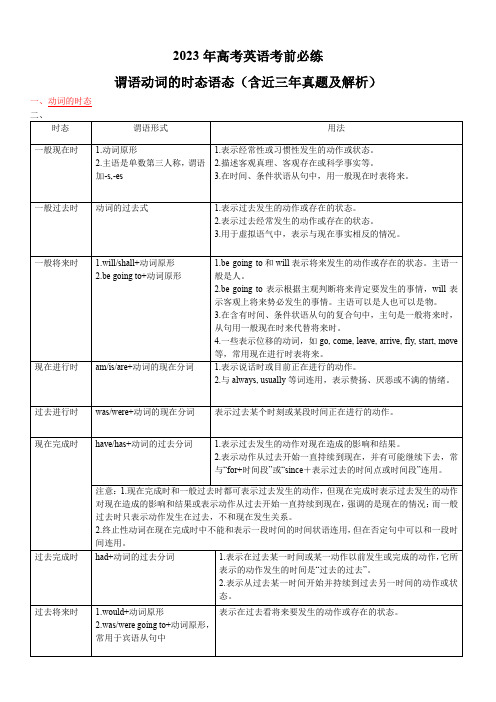
2023年高考英语考前必练谓语动词的时态语态(含近三年真题及解析)一、动词的时态特殊用法1.在时间、条件和让步状语从句中,如果主句谓语动词是一般将来时,从句用一般现在时。
如:We’ll have a picnic if it is fine next Sunday.如果下个星期日天气晴朗,我们将去野餐。
I’ll call you as soon as I get to Beijing tomorrow.我明天一到北京就给你打电话。
2.某些表示起始、往返、出发、到达之意的动词,可用一般现在时表示按规定、计划或安排将要发生的动作(此时一般都有一个表示未来时间的状语)。
这类动词有:begin, come, go, leave, start, arrive, end, stop, open, close等。
如:The meeting begins at 2:00 p.m. tomorrow.这个会议明天下午2点开始。
The next train leaves at 7 o’clock this evening.下一列火车将在今晚7点离开。
3.现在进行时与always, continually, forever等副词连用,表示反复出现或习惯性的动作,这种用法往往表达说话人的某种感情,如赞扬、遗憾、讨厌或不满等。
如:The rich woman is always laughing at the poor.这个有钱的夫人总是嘲笑穷人。
4.现在完成时中表示短暂动作的动词不能与for, since等引导的时间状语连用。
如与一段时间连用,要把瞬间动词转化为意思相近的延续性动词。
常见的变化有:特殊用法1.open,lock,write,read,sell,clean,wash,cut,drive等词作不及物动词时,它们的主语为物,可用主动语态表示被动意义。
如:This kind of pen writes very smoothly.这种钢笔写起来很流畅。
高中英语时态总结
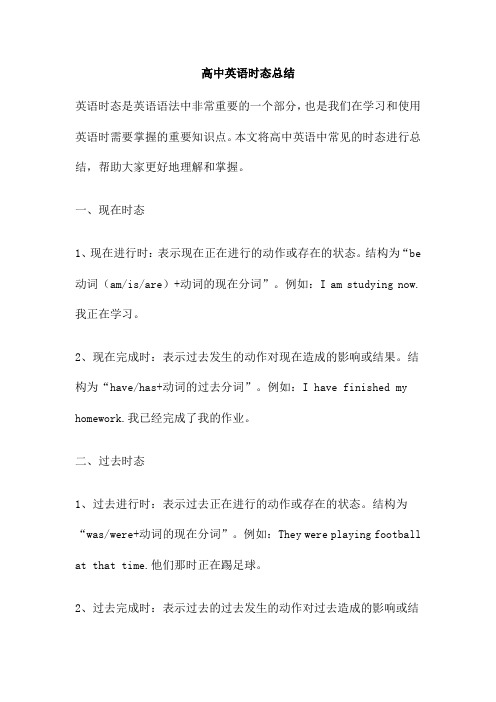
高中英语时态总结英语时态是英语语法中非常重要的一个部分,也是我们在学习和使用英语时需要掌握的重要知识点。
本文将高中英语中常见的时态进行总结,帮助大家更好地理解和掌握。
一、现在时态1、现在进行时:表示现在正在进行的动作或存在的状态。
结构为“be 动词(am/is/are)+动词的现在分词”。
例如:I am studying now.我正在学习。
2、现在完成时:表示过去发生的动作对现在造成的影响或结果。
结构为“have/has+动词的过去分词”。
例如:I have finished my homework.我已经完成了我的作业。
二、过去时态1、过去进行时:表示过去正在进行的动作或存在的状态。
结构为“was/were+动词的现在分词”。
例如:They were playing football at that time.他们那时正在踢足球。
2、过去完成时:表示过去的过去发生的动作对过去造成的影响或结果。
结构为“had+动词的过去分词”。
例如:They had finished their work before we arrived.他们在我们到达之前已经完成了他们的工作。
三、将来时态1、将来进行时:表示将来某个时间正在进行的动作或存在的状态。
结构为“will+be动词+动词的现在分词”。
例如:I will be studying at 9 o’clock tomorrow.我明天9点将会在学习。
2、将来完成时:表示将来某个时间已经完成的动作或达到的状态。
结构为“will+have+动词的过去分词”。
例如:I will have finished my homework by 10 o’clock tonight.我将在今晚10点之前完成我的作业。
以上是高中英语中常见的时态总结,希望能够帮助大家更好地理解和掌握英语时态。
需要注意的是,不同的时态有着不同的用法和结构,大家在使用时需要根据语境选择合适的时态。
高中英语高考复习时态详细讲解(共16类)
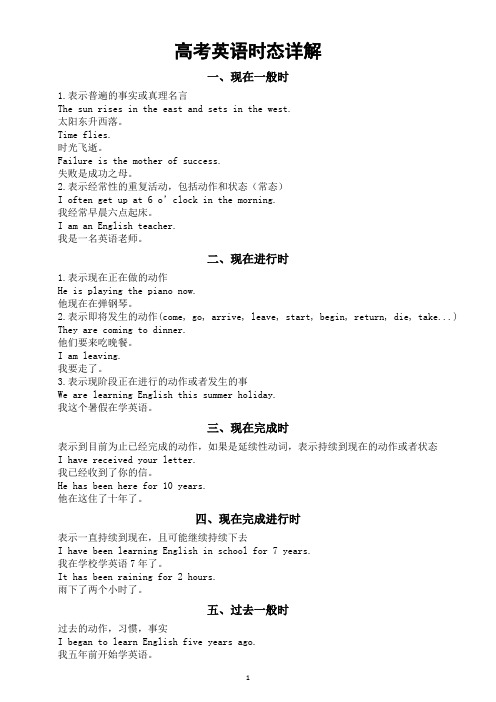
高考英语时态详解一、现在一般时1.表示普遍的事实或真理名言The sun rises in the east and sets in the west.太阳东升西落。
Time flies.时光飞逝。
Failure is the mother of success.失败是成功之母。
2.表示经常性的重复活动,包括动作和状态(常态)I often get up at 6 o’clock in the morning.我经常早晨六点起床。
I am an English teacher.我是一名英语老师。
二、现在进行时1.表示现在正在做的动作He is playing the piano now.他现在在弹钢琴。
2.表示即将发生的动作(come, go, arrive, leave, start, begin, return, die, take...) They are coming to dinner.他们要来吃晚餐。
I am leaving.我要走了。
3.表示现阶段正在进行的动作或者发生的事We are learning English this summer holiday.我这个暑假在学英语。
三、现在完成时表示到目前为止已经完成的动作,如果是延续性动词,表示持续到现在的动作或者状态I have received your letter.我已经收到了你的信。
He has been here for 10 years.他在这住了十年了。
四、现在完成进行时表示一直持续到现在,且可能继续持续下去I have been learning English in school for 7 years.我在学校学英语7年了。
It has been raining for 2 hours.雨下了两个小时了。
五、过去一般时过去的动作,习惯,事实I began to learn English five years ago.我五年前开始学英语。
高考英语时态语态知识点

高考英语时态语态知识点一、时态知识点1. 一般现在时一般现在时表示经常性或习惯性的动作、状态或客观真理等。
例句:Water boils at 100 degrees Celsius.2. 一般过去时一般过去时表示过去某个时间发生的动作或存在的状态。
例句:She lived in London for five years.3. 一般将来时一般将来时表示将来某个时间即将发生的动作或存在的状态。
例句:I will finish my homework tomorrow.4. 现在进行时现在进行时表示现在正在进行的动作。
例句:They are watching a movie right now.5. 过去进行时过去进行时表示过去某个时间正在进行的动作。
例句:She was studying when I called her.6. 将来进行时将来进行时表示将来某个时间正在进行的动作。
例句:This time next week, we will be traveling in Japan.7. 现在完成时现在完成时表示过去某个时间发生的动作对现在造成的影响或结果。
例句:I have finished my homework.8. 过去完成时过去完成时表示过去某个时间或动作之前已经发生的动作或存在的状态。
例句:She had already left when I arrived.9. 将来完成时将来完成时表示将来某个时间之前已经完成的动作或存在的状态。
例句:By this time tomorrow, I will have finished my report.二、语态知识点1. 主动语态主动语态表示主语是动作的执行者。
例句:She wrote a letter.2. 被动语态被动语态表示主语是动作的承受者,强调动作对主语的影响。
例句:The letter was written by her.3. 进行时的被动语态进行时的被动语态表示主语正在被动地进行某个动作。
高考英语时态必背知识点

高考英语时态必背知识点时态是英语语法中的一个重要部分,掌握好各种时态的用法是高考英语考试中取得高分的关键。
下面将介绍一些高考英语时态必背的知识点,帮助同学们更好地应对考试。
一、一般现在时态(Simple Present Tense)一般现在时用于表示经常性的、习惯性的、普遍性的行为或真理。
句子结构为主语 + 动词原形或第三人称单数形式。
例如:- I play basketball every Saturday.(我每个星期六打篮球。
)- She watches TV every night.(她每晚看电视。
)- The sun rises in the east.(太阳从东方升起。
)二、一般过去时态(Simple Past Tense)一般过去时用于表示过去某个具体时间发生的动作或事件。
句子结构为主语 + 动词过去式。
例如:- I went to the park yesterday.(我昨天去了公园。
)- They played soccer last weekend.(他们上周末踢了足球。
)- She studied English for two hours yesterday.(她昨天学习了两个小时的英语。
)三、一般将来时态(Simple Future Tense)一般将来时用于表示将来某个时间会发生的动作或事件。
句子结构为主语 + will + 动词原形。
例如:- I will go to the movies tomorrow.(我明天会去看电影。
)- They will have a meeting next week.(他们下周会开会。
)- She will study abroad after graduation.(她毕业后会出国留学。
)四、现在进行时态(Present Continuous Tense)现在进行时用于表示现在正在进行或发生的动作或事件。
句子结构为主语 + am/is/are + 动词-ing形式。
高考英语时态
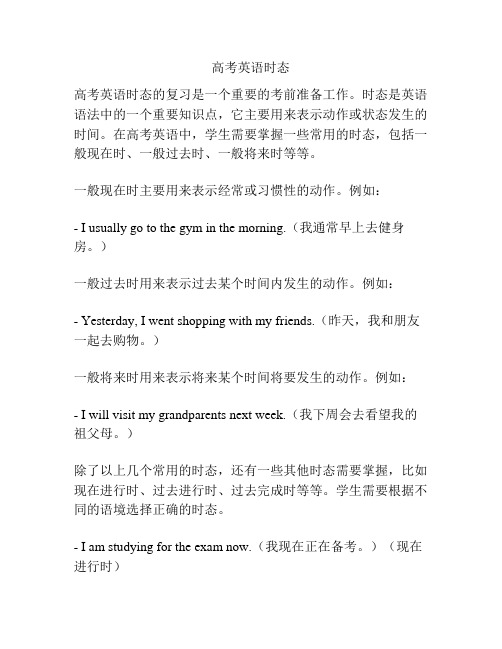
高考英语时态高考英语时态的复习是一个重要的考前准备工作。
时态是英语语法中的一个重要知识点,它主要用来表示动作或状态发生的时间。
在高考英语中,学生需要掌握一些常用的时态,包括一般现在时、一般过去时、一般将来时等等。
一般现在时主要用来表示经常或习惯性的动作。
例如:- I usually go to the gym in the morning.(我通常早上去健身房。
)一般过去时用来表示过去某个时间内发生的动作。
例如:- Yesterday, I went shopping with my friends.(昨天,我和朋友一起去购物。
)一般将来时用来表示将来某个时间将要发生的动作。
例如:- I will visit my grandparents next week.(我下周会去看望我的祖父母。
)除了以上几个常用的时态,还有一些其他时态需要掌握,比如现在进行时、过去进行时、过去完成时等等。
学生需要根据不同的语境选择正确的时态。
- I am studying for the exam now.(我现在正在备考。
)(现在进行时)- They were playing soccer in the park yesterday.(他们昨天在公园踢足球。
)(过去进行时)- She had already finished her homework when her friend visited her.(她的朋友来访时,她已经完成了作业。
)(过去完成时)时态的正确使用对于高考英语的阅读理解和写作题目都是非常重要的。
在做阅读理解题时,要仔细阅读文章,根据上下文选择正确的时态。
在写作题目中,要根据所要表达的意思选择适当的时态。
此外,时态也经常与其他语法知识点相结合使用,比如时态和语态、时态和条件句等等。
总的来说,掌握时态是高考英语复习中不可或缺的一部分。
通过大量的阅读和练习,我们可以提高对于不同时态的准确使用。
希望以上内容对你有所帮助。
高考英语时态讲解

高考英语时态讲解在英语中,时态是一种表达动词时间属性的语法形式。
在高考英语中,掌握时态的正确使用是非常重要的。
本文将详细讲解英语中的常见时态,帮助考生在高考英语考试中正确使用时态。
一、一般现在时一般现在时是英语中最基本的时态之一,它表示经常发生的动作或存在的状态。
一般现在时的基本形式是动词原形,如:I go to school every day。
在大多数情况下,动词第三人称单数和复数形式以及名词的复数形式也要加上-s或-es。
二、现在进行时现在进行时表示正在进行的动作或存在的状态。
它的基本形式是动词的现在分词形式,如:I am studying。
现在进行时通常与now,right now等时间状语连用。
三、现在完成时现在完成时表示过去发生的动作对现在造成的影响或结果。
它的基本形式是have/has +过去分词,如:I have finished my homework。
现在完成时通常与already,yet等副词连用。
四、一般过去时一般过去时表示过去发生的动作或存在的状态。
它的基本形式是动词的过去式,如:I went to the park yesterday。
在大多数情况下,动词第三人称单数和复数形式以及名词的复数形式也要加上-ed或-d。
五、过去进行时过去进行时表示过去正在进行的动作或存在的状态。
它的基本形式是was/were +现在分词,如:I was studying at this time yesterday。
过去进行时通常与at this time yesterday等时间状语连用。
六、过去完成时过去完成时表示过去的过去发生的动作对过去造成的影响或结果。
它的基本形式是had +过去分词,如:I had finished my homework before dinner。
过去完成时通常与already,yet等副词连用。
七、一般将来时一般将来时表示将来要发生的动作或存在的状态。
它的基本形式是will +动词原形,如:I will go to school tomorrow。
高考英语时态知识大全汇总

高考英语时态知识大全汇总时态在英语中扮演着非常重要的角色,准确使用时态能够帮助我们清晰地表达自己的意思,因此在高考英语考试中也是一个重要的知识点。
下面是高考英语时态知识的详细介绍。
一、一般现在时一般现在时表示经常性的、习惯性的动作、事实或者真理。
结构:主语 + 动词原形(第三人称单数加s或es)1. 表示经常性的动作或习惯例句:I always get up early in the morning.I often go to the park on weekends.2. 表示客观真理或普遍规律例句:The sun rises in the east.Water boils at 100 degrees Celsius.二、一般过去时一般过去时表示过去某个时间发生的动作或存在的状态。
结构:主语 + 动词的过去式1. 表示过去发生的某个具体动作例句:Yesterday, I went to the cinema with my friends.They visited their grandparents last week.2. 表示过去的某个状态或习惯性动作例句:He used to swim every day when he was young.She lived in London for five years.三、一般将来时一般将来时表示将来某个时间会发生的动作或存在的状态。
结构:主语 + will + 动词原形1. 表示未来发生的某个具体动作例句:I will visit my grandparents next week.She will go shopping tomorrow.2. 表示预测、打算或意愿例句:I think it will rain tonight.They will have a party to celebrate their anniversary.四、现在进行时现在进行时表示正在进行的动作。
高考英语考纲要求的十种时态

(change) his mind after a phone call at
பைடு நூலகம்
the last minute.
5【答案】 changed
【解析】 本题考查动词的时态。句意:——彼得会来吗?——不来了,刚
才接到一个电话之后他改变主意了。根据句子的时间状语after a phone
call at the last minute可知,彼得改变主意是过去发生的动作,是回答问题
9
含有情态动词的被动语态
被动语态的构成(以ask为例) am/is/are asked was/were asked
shall/will be asked would be asked
am/is/are being asked was/were being asked have/has been asked
一般现在时的被动语态
1.When fat and salt ____are removed______ (remove) from food,the food tastes as if it is
missing something
根据语境可知此处用一般现在时,由于主语 fat and salt是复数概念,且与remove是被动 关系,所以填一般现在时的被动语态结构 are removed。
者的回忆内容,因此应该用一般过去时。
一般过去时
Later,engineers managed (manage) to construct railways in a system of deep tunnels(隧道),which became known as the Tube. 答案 managed 根据句子的时间状语Later以及从句的谓语动词became可知,这里 用一般过去时。
高考英语复习常见八种时态整理

英语中八种常见时态常用时间状语归纳一、一般现在时1. 概念:表示现阶段经常发生的动作或现在的某种状况,也表示客观事实、客观规律或客观真理。
谓语动词要用原形,主语是第三人称时,谓语动词要用第三人称单数形式。
2. 常见时间状语标志:always, often, sometimes, usually, every day, on Sundays, oncea day / week / month等。
例如:I do some exercise every day. 我每天做一些锻炼。
She knows French and German besides English. 除英语外,她还懂法语和德语。
The sun rises in the east. 太阳从东边升起。
二、一般将来时1. 概念:表示将来发生的动作或存在的状态,以及打算、计划或准备做某事。
2. 常见时间状语标志:tomorrow, the day after tomorrow, next day / week / month / year…, this week / month / year, soon, in + 时间状语(如in one hour / in a few minutes等),in the future, in future等。
例如:I’ll take you there tomorrow. 我明天带你去那儿。
Next month we will have our school open day. 下个月我们将迎来学校开放日。
The Talent Show is coming in two weeks’time. 新秀选拔演出还有两周时间就要到了。
三、一般过去时1. 概念:表示在过去的某个时间发生的动作或存在的状态,也表示过去习惯性、经常性的动作。
谓语动词要用过去时。
2. 常见时间状语标志:yesterday, the day before yesterday, last night / week / month, 时间词+ ago (如three days ago), in / on + 过去的时间词(如in 2010), just now, at that time, in those days, one day, long long time ago, once upon a time等。
高考英语的时态知识点

高考英语的时态知识点(经典版)编制人:__________________审核人:__________________审批人:__________________编制单位:__________________编制时间:____年____月____日序言下载提示:该文档是本店铺精心编制而成的,希望大家下载后,能够帮助大家解决实际问题。
文档下载后可定制修改,请根据实际需要进行调整和使用,谢谢!并且,本店铺为大家提供各种类型的经典范文,如演讲稿、总结报告、合同协议、方案大全、工作计划、学习计划、条据书信、致辞讲话、教学资料、作文大全、其他范文等等,想了解不同范文格式和写法,敬请关注!Download tips: This document is carefully compiled by this editor. I hope that after you download it, it can help you solve practical problems. The document can be customized and modified after downloading, please adjust and use it according to actual needs, thank you!In addition, this shop provides you with various types of classic sample essays, such as speech drafts, summary reports, contract agreements, project plans, work plans, study plans, letter letters, speeches, teaching materials, essays, other sample essays, etc. Want to know the format and writing of different sample essays, so stay tuned!高考英语的时态知识点时态(tense)是一种动词形式,不同的时态用以表示不同的时间与方式。
高考英语必须掌握的十六种时态
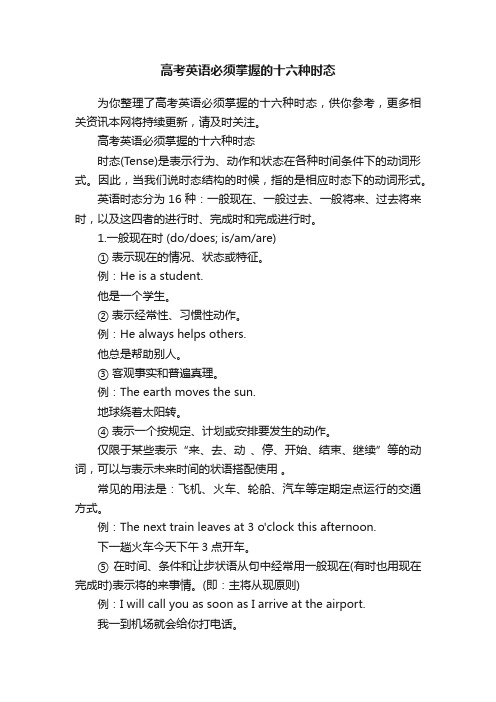
高考英语必须掌握的十六种时态为你整理了高考英语必须掌握的十六种时态,供你参考,更多相关资讯本网将持续更新,请及时关注。
高考英语必须掌握的十六种时态时态(Tense)是表示行为、动作和状态在各种时间条件下的动词形式。
因此,当我们说时态结构的时候,指的是相应时态下的动词形式。
英语时态分为16种:一般现在、一般过去、一般将来、过去将来时,以及这四者的进行时、完成时和完成进行时。
1.一般现在时 (do/does; is/am/are)① 表示现在的情况、状态或特征。
例:He is a student.他是一个学生。
② 表示经常性、习惯性动作。
例:He always helps others.他总是帮助别人。
③ 客观事实和普遍真理。
例:The earth moves the sun.地球绕着太阳转。
④ 表示一个按规定、计划或安排要发生的动作。
仅限于某些表示“来、去、动、停、开始、结束、继续”等的动词,可以与表示未来时间的状语搭配使用。
常见的用法是:飞机、火车、轮船、汽车等定期定点运行的交通方式。
例:The next train leaves at 3 o'clock this afternoon.下一趟火车今天下午3点开车。
⑤ 在时间、条件和让步状语从句中经常用一般现在(有时也用现在完成时)表示将的来事情。
(即:主将从现原则)例:I will call you as soon as I arrive at the airport.我一到机场就会给你打电话。
When you have finished the report, I will have waited for about 3 hours.等你完成这份报告的时候,我就已经等了将近3个小时了。
2. 现在进行时(am/is/are doing)① 表示此时此刻正在发生的事情。
例:He is listning to the music now.他现在正在听音乐。
高考英语常考动词八种时态

如果行为动词作谓语,变疑问句加did,变否定句加didn’t,动词要还原。
1.主句+ if / as soon as / when/not … until /unless +从句(主句用一般将来时,从句用一般现在时。)
2.表示安排或计划好近期要做的动作,常用进行时表示将来的;动词有:come , leave, go, return,start , arrive, work,sleep,do,
give ,have等。
现在进行时与一般现在时的区别:现在进行时谈论动作与情况的暂时性;一般现在时则是用来表示动作的永久性、经常性。
8. It’s +时间+since +从句(一般过去时(肯)
9.主句(现在完成时+since从句(一般过去时)
10.It’s the first/the only/the best…+现在完成时
11.How long +延续性动词
1.用在间接引语或宾语从句中(即主句过去时从句过去时)
2.在叙述过去的事情时,在当时看未来将要发生的事。
1.用在间接引语或宾语从句中(即主句过去时从句过去时)
2.当when, as soon as,
before, after等引导时间
状语从句时,主句用过
去完成时,从句用一般
过去时。
1.now
2. at present
3.right now = right away
4. at the moment
5. look, listen开头的句子。
6. It’s 7 o’clock +现在进行时态
高考英语十大时态

2019-3-16
2019-3-16
1
1.一般现在时:
主动语态: 1. am / is / are 2. do / does 被动语态: am / is / are done
2
2. 一般过去时: 主动语态: 1.was / were 2. did 被动语态:
was / were done
一般将来时: 被动语态: 1. will / shall be done 2.am / is / are going to be done 3. am / is / are about to be done 4.am / is / are to be done 5.am / is / are being done 6.am / is / are done
5
4.现在进行时: 主动语态:
am / is /are doing 被动语态:
am / is / are being done
6
5. 过去进行时: 主动语态: was / were doing
被动语态:
was / were being done
7
6. 将来进行时: 主动语态: shall / will be doing 被动语态:
3
3.一般将来时: 主动语态: 1. will / shall do 2. am /is /are going to do 3. am / is /are about to do 4. am / is / are to do 5. am / is / are doing 6. do / does
4
被动语态:
have / has been being done
11
高考英语必考语法时态的归纳总结及相关注意点
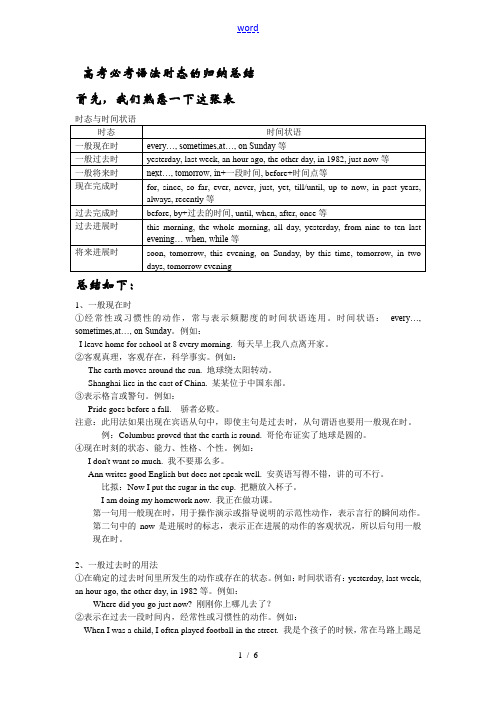
高考必考语法时态的归纳总结首先,我们熟悉一下这张表总结如下:1、一般现在时①经常性或习惯性的动作,常与表示频腮度的时间状语连用。
时间状语:every…, sometimes,at…, on Sunday。
例如:I leave home for school at 8 every morning. 每天早上我八点离开家。
②客观真理,客观存在,科学事实。
例如:The earth moves around the sun. 地球绕太阳转动。
Shanghai lies in the east of China. 某某位于中国东部。
③表示格言或警句。
例如:Pride goes before a fall.骄者必败。
注意:此用法如果出现在宾语从句中,即使主句是过去时,从句谓语也要用一般现在时。
例:Columbus proved that the earth is round. 哥伦布证实了地球是圆的。
④现在时刻的状态、能力、性格、个性。
例如:I don't want so much. 我不要那么多。
Ann writes good English but does not speak well. 安英语写得不错,讲的可不行。
比拟:Now I put the sugar in the cup. 把糖放入杯子。
I am doing my homework now. 我正在做功课。
第一句用一般现在时,用于操作演示或指导说明的示范性动作,表示言行的瞬间动作。
第二句中的now是进展时的标志,表示正在进展的动作的客观状况,所以后句用一般现在时。
2、一般过去时的用法①在确定的过去时间里所发生的动作或存在的状态。
例如:时间状语有:yesterday, last week, an hour ago, the other day, in 1982等。
例如:Where did you go just now? 刚刚你上哪儿去了?②表示在过去一段时间内,经常性或习惯性的动作。
- 1、下载文档前请自行甄别文档内容的完整性,平台不提供额外的编辑、内容补充、找答案等附加服务。
- 2、"仅部分预览"的文档,不可在线预览部分如存在完整性等问题,可反馈申请退款(可完整预览的文档不适用该条件!)。
- 3、如文档侵犯您的权益,请联系客服反馈,我们会尽快为您处理(人工客服工作时间:9:00-18:30)。
英语的16种时态英语共有十六种时态,其表现形式如下(以study为例):1. 一般现在时He always_______(help)others.The next train _______(leave)at 3 o'clock this afternoon.2. 现在进行时(be doing)They_______(have)a meeting.I_______(study)at an evening school.Mike _______(come)home on Thursday.They_______(have)a party next week.■现在进行时在时间和条件状语从句中,代替过去将来时。
如:He will promise to buy me a computer if he _______(get )a raise.3. 现在完成时(have done)A) 表示动作到现在为止已经完成或刚刚完成。
例:I bought a new house, but I _________ my old one yet, so at the moment I have two houses.A) didn't sell B) sold C) haven't sold D) would sellB) 表示从过去某时刻开始,持续到现在的动作或情况,并且有可能会继续延续下去。
例:Great as Newton was, many of his ideas ___________ today and are being modified by the work of scientists of our time.A) are to challenge C) have been challengedB) may be challenged D) are challenging4. 现在完成进行时(have been doing)用法:表示某一动作开始于过去某一时间,延续或重复地出现至今,或将继续延续至将来。
例:We _______(work)on this project for over a month now.5. 一般过去时I _______(want )to ask you if I could borrow your car?_______(will)you mind my sitting here?6. 过去完成时(had done)用法:表示在过去的某个时间或动作以前已经发生的动作或已经存在的状态。
Until then, his family _________ from him for six months.A) didn't hear C) hasn't heard B) hasn't been hearing D) hadn't heard7. 过去将来时(would/ should do)用法:表示从过去的某个时间看将要发生的事。
例:I said on Thursday I_______(shill )see my friend the next day.8. 过去进行时(was/ were doing)A) 表示在过去一个比较具体的时间正在发生的动作。
Mary _______( listen) to light music 10 minutes ago.B) 如果when, while这样的时间状语引导词所引导的主从句之一是一般过去时,则另一个句子常用过去进行时。
I _______( wash) my hair when you knocked at the front door.9. 一般将来时用法:A) 基本结构是will / shall do。
We _______(send )her a glass hand-made craft as her birthday gift.My mother _______(come) to visit me next week .D) 表示“即将、正要”时,可用be about to do。
Don't worry, I ___ ___ ____make a close examination on you.E) "be to do"的5种用法:I was _______ the point of telephoning him when his letter arrived.A) in B) to C) at D) on10. 将来进行时(will be doing)用法:强调在将来的某个具体时间正在发生的动作或事情。
例:Don't worry, you won't miss her. She_______( wear) a red T-shirt and a white skirt at that time.11. 将来完成时(will have done)The conference __________ a full week by the time it ends.A) must have lasted B) will have lastedC) would last D) has lasted初中英语时态练习100题1.I will tell him as soon as he _____ backA. comeB. comesC. will comeD. came2. Mary _____ on shoes when she ____ them.A. tries…buysB. tries… buiesC. trys… buysD. trys… buies3. The girl often ______ cold when she ______.A. cathcs…dancesB. catches… dancesC. catchs…danceesD. catches… dancee4. _____ he ____ himself there? No, I don't think so.A. Do…enjoyB. Does… enjoiesC. Does… enjoysD. Does…enjoy5. _____ your teacher ____ from them very often? Certainly.A. Do…hearB. Does…hearC. Do… receiveD. receive6. _____ your mother _____ some cleaning on Sundays?A. Does…doesB. Do…doesC. Does…doD. Do… do7. _____ Tom _____to work hard to help his family ? Yes, he _____.A. Has… x…doesB. Has…x…doesC. Does…has…hasD. Does… have…does8. Which teacher _____ lessons to you every day ?A. does …givesB. does… giveC. do… giveD. gives9. Smith does not go fishing on weekdays, ____? _____ , he does.A. does he…NoB. does he…YesC. doesn't he…NoD. doesn't he…Yes10.Mr Black often _____ fishing on Sundays, _____ he ?A. goes…doesn'tB. goes…isn'tC. doesn't go…doesD. doesn't go…is11.He usually _____ TV on Sunday evening.A. watchB. watchesC. watchingD. is watching12. We'll go to play with snow if it ______ tomorrow.A. snowB. snowsC. will snowD. snowed13. Neither I nor he ______ French.A. speakB. doesn't speakC. speaksD. doesn't speak14. Nobody ______ how to run this machines.A . know B. have known C. knows D. is knowing15. The Young Pioneer _____ water for the old man every day.A. carryB. bringC. takesD. carries16. Some are ______ in the river and some are ______ games.A. swimming…playingB. swimming…plaiingC. swimming… I playingD. swimming…plaing17. Look ! The boy students are _____ football while the girls are _____ .A. playing… danceB. playing… dancingC. play… dancingD. play… dance18. He _____ to do his lessons at eight every evening.A. is beginningB. is beginningC. beginD. begins19. _____ he _____ on well with his friends this term ?A. Does…getsB. Does…getC. Is…gettingD. Is…geting20. Mr Smith _____ short stories, but he ____ a TV play these days.A. is writing…is writingB. is writing… writesC. writes… is writingD. writes… writes参考答案:1—5 BABDB 6—10 CDDBA 11—15 BBCCD 16—20 CBDCC21. I _____ to the cinema. I ______ there every Sunday.A. go…goB. am going… goC. go… am goingD. am going…am going22. Look, they______ a good time, ____ they ?A. have…doB. have…don'tC. are having…areD. are having… aren't23. You ______ about the future now, ______ you ?A. don't think…don'tB. aren't thinking… aren'tC. don't think… doD. aren't thinking… are24. She always ______ something whenever she ______.A .studied…played B. studied…plaiedC.. studied…plaiedD. studied… played25. He often _____ late in the forest. It _____ me very much.,A. stayed…worriedB. staied… worriedC. stayed…worryedD. staied… worried26. I ______that the boy _____ with no tears in his eyes.A. noticed… cryedB. noticed… criedC. noticed…criedD. noticed… cryed27. We _____the floor and _____ all the windows.A. mopped… cleannedB. moped… cleanedC. mopped…cleanedD. moped… cleaned28. When I _____ the Children's Palace, the children _____ with joy.A. visited… jumppedB. visited… jumpedC. visited… jumpedD. visited… jumpped29. ______ a sports meet last Sunday ? Yes , they ______.A. Did they have… didB. Did they have… hadC. Had they... had D. Had they (i)30. ____ you _____out for a walk after supper ? Yes, I ______.A. Did…went…wentB. Did… go… wentC. Did... went... did D. Did... go (i)31. _____ Jack _____ on with his work or ______ to have a rest?A. Did… went… stoppedB. Did… go… stopC. Did… went… stopD. Did… go… stopped32. You gave them a talk two days ago, _____you ? Yes, I ______.A. did… didB. did… gaveC. didn't… didD. didn't… gave33. ____ your brother _____ a letter to ? My father.A. Who… wroteB. What…wroteC. Who did…writeD. What did… write34. They _____ about the TV news then in the sitting-room. They often ____ such talk sA. talked…hadB. talk…haveC. were talking…hadD. are talking…have35. He ______ some cooking at that time, so _____ me.A. did… heardB. did… di dn't hearC. was doing… heardD. was doing… didn't hear36. " _____ you angry then?" "They_ too much noise.”A. Are…were makingB. Were…were makingC. Are…madeD. Were… made37. This time yesterday Jack _____ his, bike. He _____ TV.A. repaired… didn't watchB. was repairing… watchedC. repaired… watchedD. was repairing… wasn't watching38. We _____ for Tom at ten last Sunday. He often kept us ______.A. were waiting… waitingB. were waiting… waitC. waited… waitingD. waited… wait39. When you _____ at the door, I _____ some washing.A. knocked... did B. was knocking (i)C. knocked… was doingD. knock… am doing40. The boy_____ English on the radio when I _____ his door.A. learned… was openingB. was learning… openedC. learned… openedD. is learning… open参考答案:21-25 BDDDA 26—30 BCBAD 31—35 BCCCD 36—40 BDACB41. When they______ through the forest, a bear _____ at them.A. walked… was comingB. were walking… cameC. were talking… comesD. walk… is coming42. A young man _____ her while she _____ her work .A. watched… was finishingB. was watching… finishedC. watched… finishedD. was watching… was finishing43. While mother _____ some washing, I ______ a kite for Kack.A. did… madeB. was doing… madeC. was doing… was makingD. did… was making44. I _____ myself French from 7 to 9 yesterday morning. I _____ to work.A. was teaching… didn't goB. taught… didn't goC. was teaching… wentD. taught… went45. He _____ a model plane when I came to see him.A. makesB. is makingC. was makingD. made46. I ______ a letter at nine last night.A. is writingB. was writingC. wroteD. is writing47. The teacher_____ (give) us a history lesson when Tom walked into the classroom.A. gaveB. is givingC. was givenD. was giving48. There will be a football match in two days, that is _______.A. last SundayB. next SundayC. every SundayD. this Sunday49. We ______ class meeting this November.A. hadB. haveC. will haveD. are having50. He ______ in his garden every morning next year.A. will workB. worksC. workedD. is working51. Be careful. The train ______.A. will comeB.C. comesD. is coming52. Look at those clouds. It _____ soon, I'm afraid.A. is going to rainB. is rainingC. will rainD. won't rain53. The radio says it ______ the day after tomorrow.A. is going to snowB. is snowingC. will snowD. snows54. _____ he _____ some shopping tomorrow afternoon ?A. Will…doesB. is going to doC. is…doingD. Shall… do55. What day _____ it ______ tomorrow ? Wednesday.A. is… going to beB. will…beC. shall…beD. does…be56. The boy _______ sixteen years old next year.A. is going to beB. is growing to beC. will beD. is57. _____ you ____ me up at six, please ?A. Are…going to wakeB. Are…wakingC. Will…wakeD. Do…wake58. If he ______ to college, he _____ a lot more.A. will go…will learnB. will go…is going to learnC. is going… is going to learnD. goes… will learn59. When she _____ next time ,l ______ her everything.A. is going to come…shall tellB. will come…shall tellC. comes…will tellD. come…will tell60. What day ____ it ____ tomorrow ? It ____Tuesday.A. is…going to be… isB. will…be…willC. is…going to be…is goingD. will be…will be 参考答案:41-45 BDCAC 46—50 BDDCA 51—55 DACBB 56—60 CCDCD61. She _____that she _____ her best to help them the next term.A. says…will doB. said…will doC. said… would doD. says…would do62. People _____ that the Smiths _____ for a holiday next week.A. say… will goB. said… will goC. said… would goD. say…would go63. Nobody _____ us that he _____ even stricter with usA. tell…will beB. tells…would beC. told…will beD. told…would be64. Please _____ him that we _____ able to help him.A. tell…will beB. tells… would beC. told…will beD. told… would be65. Jack _____ that they _____ surprised to see it this Friday.A. know… would beB. knows… will beC. knew… would beD. knew… will be66. I _____to know if Mary_____ by train that afternoon.A. want… would goB. want… will goC. wanted… would goD. wanted… will go67. _____ he _____ that they _____ home tomorrow?A. Does… learn… would goB. Does… learn… will goC. Did… learn… would goD. Did… learn… will go68. We _____ that they _____ a sports meet tomorrow.A. learn… would haveB. have learned… would haveC. learn… will haveD. have learned… will have69. ____ you _____ that he _____ his lost son one day ?A. Do…think…will findB. Do…thought…would findC. Did…think…will findD. Did…thought…would find70. I _____ that you _____ good care of her that day.A. thought…will takeB. thought…would takeC. think… will take B. think… would take71. The visitors _____ where they _____ a short test.A. ask… would takeB. ask… will takeC. asked… would takeD. asked… can take72. John ____ sure that he ____ good at chemistry soon.A. be… will beB. is, would beC. was…will beD. was… would be73. She ____ ill so she ____ able to go skating the next day.A. is… won't beB. is… wouldn't beC. was… won' beD. was… wouldn't be74. He _____ the thief to the police when he _____ the man again.A. would take… would meetB. would take…metC. will take… will meetD. will take… meet75. Mother ____ me a new coat yesterday, I _____ it on. It fits me well.A. has made…have triedB. made…have triedC. has made…triedD. made…tried76. " He ____ to draw horses already ."" When ____he ?”. " Last year. "A. learned...has B. learned...did C. has learned...has D. has learned (i)77. Tom ____ up into the tree. Look, he _____ high up there !A. has got… isB. has climbed… wasC. got… wasD. climbed… is78. _____you _____ the text yet ? Yes, we _____ it two hours ago.A. Did…copy…didB. Have… copied…haveC. Have… copied… didD. Did …copy…had79. "Why she angry?" "Because he _____ at he just now.A. did… get, shoutedB. has…got…shoutedC. did… get… has shoutedD. has…got…has shouted80. _____ you ______ the film before ? Where ____ you _____ it ?A. Have… seen… did… seeB. Did…see…die…watchC. Have…seen… have… seenD. Did…see…have…seen参考答案:61-65 CADAB 66—70 CBDAB 71—75 CDDBB 76—80 DACBA81. You _____ me waiting for two hours. I _____ for you since five.A. Kept…waitedB. have kept…waitedC. kept…have waitedD. have kept…have waited82. Where _____John _____? To the library. He _____ there for an hour.A. has… been … has goneB. has…gone…has beenC. did… go… wentD. did…be…went83. _____ the baby still _____ ? No, it ______ crying.A. Has… cried… has stoppedB. Is…crying…stoppedC. Did… cry… stoppedD. Is…crying…has stopped84. I _____ the way. I ______ here for quite many years.A. knew... have lived B. knew (iv)C. know... have lived D. know (iv)85. _____ you ever _____America ? Yes, I have.A. Have… gone toB. Have… gone inC. Have… been toD. Have… been in86. My brother _______ college for over three years.A. has gone toB. has been toC. has been inD. has been for87. He _____ the Army by the end of 1992. He ____ in the army since then.A. joined…isB. has joined…has beenC. had joined…isD. has joined… has been88. By the time I _____ back they ____ up ten metres.A. came…have climbedB. came…had climbedC. come…have climbedD. had come…climbed89. Jack ____ over five lessons by seven o'clock. Then he____ a test.A. went…tookB. went…had takenC. had gone…tookD. had gone…had taken90. We _____ out by that time that he ____ a thief for a long time.A. had found…had beenB. had found…wasC. found…had beenD. found…was91. Before the new _____ him, he ____ to know about it.A. reaches… has gotB. reached…had gotC. reached… gotD. had reached…got92. I _____ him a second letter before I _____ from him.A. wrote… heardB. wrote… had heardC. had written… heardD. have written… hear93. We _____ in a good harvest because we ______ enough rain.A. didn't get… had hadB. got… had hadC. had got… had badD. got… hadn't had94. They ____for five hours when they ____ in New York.A. flew…arrivedB. had flown…had arrivedC. flew…had arrivedD. had flown…arrived95. She ____ that ____ it for two days by that day.A. says…has rainedB. says…had rainedC. said… had rainedD. said…rained96. John _____ there since the year before, so he ____ them.A. had worked…knewB. had worked….had knownC. worked…knewD. worked…had known'97. He _____ angry because he _____ for a long time.A. had got…had waitedB. got…waitedC. had got…waitedD. got…had waited98. Paper _____ first invented in China.A. isB. areC. wasD. were99. The Greens _____ China for five years.A. has been inB. have been inC. went toD. has gone to100.There _____ an eraser under the desk. Is it yours ?A. isB. hasC. wasD. had参考答案:81-85 DBDCC 86—90 DDBCA 91—95 BCBDC96-100 ADCBA。
